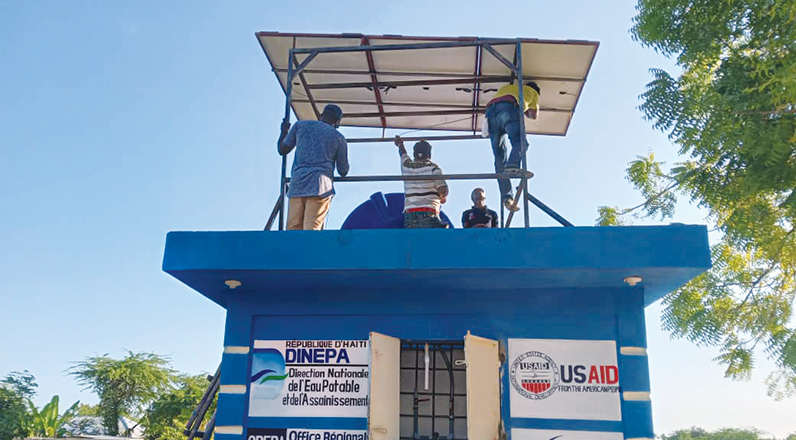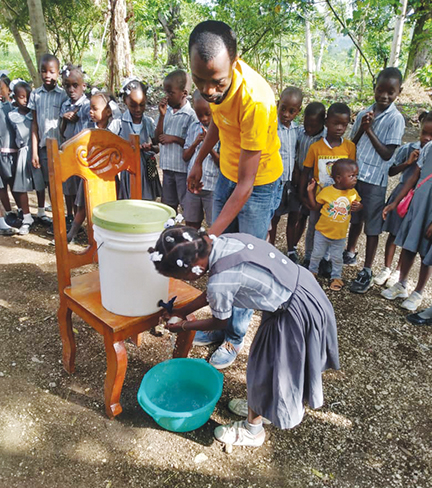
Catholic Relief Services works to provide a number of resources in Haiti, including this solar-powered community potable water system in Belle Anse in southern Haiti.
Catholic and other relief groups continue to work and help in Haiti, despite the increasingly dire situation in Port-au-Prince, where gangs are taking over neighborhoods and restricting access to highways that lead to rural areas.
The leader of one relief organization reported that several hospitals in the capital city had closed and been looted by gangs. Meanwhile, she said supply lines are blocked.
"You cannot transport medicine and supplies from the warehouse to the hospital," explained the relief leader, who asked that neither she nor her organization be named due to security concerns. "What we have in stock is what we are using right now. When it's gone, it's gone."

Photo by Paul Etienne Felix
Some relief workers in hard-hit areas are working remotely while some in less-affected outlying areas continue to work on-site at clinics or offices, report leaders from the groups, including Catholic Relief Services and Medicines for Humanity.
Thousands are fleeing the capital as gang violence continues, a response to political instability. The months of January and February have been the most violent in the last two years in Haiti, according to a United Nations report, with more than 2,500 people killed, kidnapped or injured. Gangs have orchestrated attacks on prisons, ports and hospitals.
Bishop A. Elias Zaidan, the chairman of the Committee on International Justice and Peace for the U.S. Conference of Catholic Bishops, called for the U.S. government and the international community to address the country's challenges.
"As the social, political, and security situation in Haiti continues dangerously to deteriorate, I would like to express my steadfast solidarity with my brother bishops and the people of Haiti," Bishop Zaidan said in a statement released by the conference. "I would like to commend especially the heroic efforts of Haitian and international aid workers, including our own Catholic Relief Services, who are working tirelessly to provide vitally necessary assistance to the people of Haiti."
Haiti is no stranger to tragedy. Hurricane Matthew devastated the country in 2016. It was the largest humanitarian emergency in the country since the 7.0 magnitude earthquake in 2010 that killed up to 300,000 people. A 7.2 magnitude earthquake hit in 2021, killing more than 2,000 people.
St. Francis de Sales Hospital in Port-au-Prince was destroyed in the 2010 earthquake. A replacement hospital opened in 2015. The hospital is one of several that have been closed and looted by gang members.
"They're pulling the wire from the hospital from the walls," said the relief organization leader.
Medicines for Humanity Executive Director Kristen Lilley keeps close tabs on 10 staff members working in Haiti, including a few in Port-au-Prince. Medicines for Humanity focuses on child health projects in seven countries and has five programs in Haiti.
One of the clinics it works with had to close temporarily because of the violence, said Lilley. The nuns who also work in the clinic live in a convent across the street. "Sometimes when gunshots start coming out when they're crossing the street, the sisters have to drop to the ground to avoid being shot," said Lilley.
She said gang members have assured the nuns they will not shoot them, and the nuns replied that stray bullets don't know the difference. "When I heard that, I just started crying because it's a good picture of the indiscriminate violence and how once people start shooting, anybody who is in the way is affected," Lilley said.
The situation changes depending on the day or the week, said Lilley, and the workers communicate closely and work with security groups to monitor the situation. Supply availability also varies, and workers may have to get necessities from pharmacies or locations outside of the harder-hit areas, she said.
Medicines for Humanity has worked with United Nations agencies and other groups to ship supplies across the bay to avoid an area where goods have been stolen, she said.
"Our team is very resilient, they're very compassionate, along with all our partners," Lilley said. "So they try to find the most reasonable and safest options and routes to get supplies, but it has definitely affected what we have available in those areas outside of Port-au-Prince."
While offices for Catholic Relief Services remain open in outlying parts of Haiti, the office in Port-au-Prince has been closed since early March, says Robyn Fieser, deputy director of media relations.
More than 250 Catholic Relief Services staffers work around the country. Their work includes helping local farmers, installing solar-powered water systems to provide clean drinking water, and providing youth skills training and early literacy in schools. Some staffers have left their jobs because of the unrest, and the country director and three other staffers evacuated Haiti in late March, Fieser said.
Many staffers are working double time to coordinate with other relief organizations to provide help while also dealing with internet issues, said Fieser.
"Amidst all of this chaos, we are still working," she said, adding that she recently got an "amazing" video of a little girl in Haiti speaking in Creole about how much she loves school. "It gives you a little bit of hope," she said.
To donate, visit Medicines for Humanity at medicinesforhumanity.org and Catholic Relief Services at crs.org.
